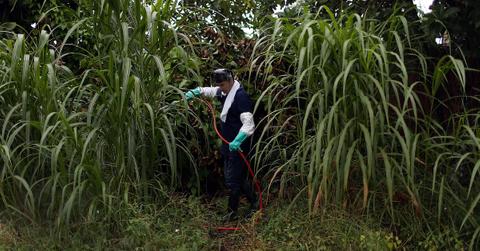Miami Bans Glyphosate, the Infamous Monsanto Herbicide Polluting the City's Lakes
The ban goes into effect immediately.
Updated March 5 2019, 3:25 p.m. ET

Last week, the city of Miami passed a resolution banning the use of an infamous herbicide on city property. Beginning immediately, the city will no longer allow the use of glyphosate, a herbicide brought to the market by Monsanto under the name Roundup. Glyphosate is known to be a pollutant and is suspected to cause health issues including cancer, so environmentalists across the Florida city are undoubtedly applauding the bill.
Miami Waterkeeper, an environmental organization that aims to protect South Florida's watershed, announced the news about glyphosate's citywide ban on its website. As the nonprofit explained, the resolution was sponsored by Miami Commissioner Ken Russell and co-sponsored by Mayor Francis Suarez. It was presented at City Hall on Thursday, Feb. 28, and passed unanimously.
Russell told The Miami New Times that he got involved with the bill as a response to the "blue-green algae blooms, red tide, and fecal contamination" that recently surfaced in Miami. The explosive algae blooms in Florida's lakes may sound nice, but as reported by the The Miami Herald, they actually cover lakes with pollution taking the form of green slime. Furthermore, Miami Waterkeeper explained that glyphosate can destroy aquatic plant ecosystems, including coral reefs — and Russell clearly sees that.
"Water quality issues are so important to the city of Miami, and we can be one of the worst polluters as a municipality," Russell told The Miami New Times. "We ask for residents to make a change in their habits and that they be conscious of what they put in their gardens, but when I realized the totality of what the city uses at any given time, we had to change our habits."
In addition to causing pollution, glyphosate is also known to be a carcinogen. In 1985, the EPA classified Roundup as a Class C Carcinogen, meaning it holds the potential to cause cancer, as per Sustainable Pulse. The chemical's carcinogen status has fluctuated over the past few decades, but in 2018, a man won a lawsuit after claiming that Roundup had caused his non-Hodgkin lymphoma. According to TIME, former school groundskeeper Dewayne Johnson was drenched in glyphosate after a sprayer broke on the job, and he later was diagnosed with cancer. A jury found Monsanto guilty of not warning Johnson about the carcinogenic risks of Roundup, and Monsanto was ordered to pay him $78 million, TIME added.
Here's a bit of background info on glyphosate's controversial rise to becoming the most popular herbicide in the world, according to The Scientist Magazine. As explained by Sustainable Pulse, in 1970, a scientist for the controversial agricultural company Monsanto discovered that the chemical glyphosate could kill weeds, and Monsanto patented it as a herbicide. In 1974, the company released glyphosate onto the market under the name Roundup, and by 1996, Monsanto had developed Roundup Ready genetically modified crops. According to the Massachusetts Institute of Technology, Roundup Ready crops are genetically modified to be resistant to glyphosate. Basically, the development of these GMOs allowed crops to be sprayed with endless amounts of Roundup, as it will only kill weeds, not the food.
According to the The Miami New Times, Miami typically uses 4,800 gallons of products containing glyphosate every year — meaning the new ban is going to significantly reduce the amount of glyphosate in the air and water. The ban does not seem to affect private businesses or citizens from using Roundup, but perhaps it will inspire people to find new ways to manage their crops, just like city officials will be doing. Hopefully the new methods will come with less environmental consequences and health risks.